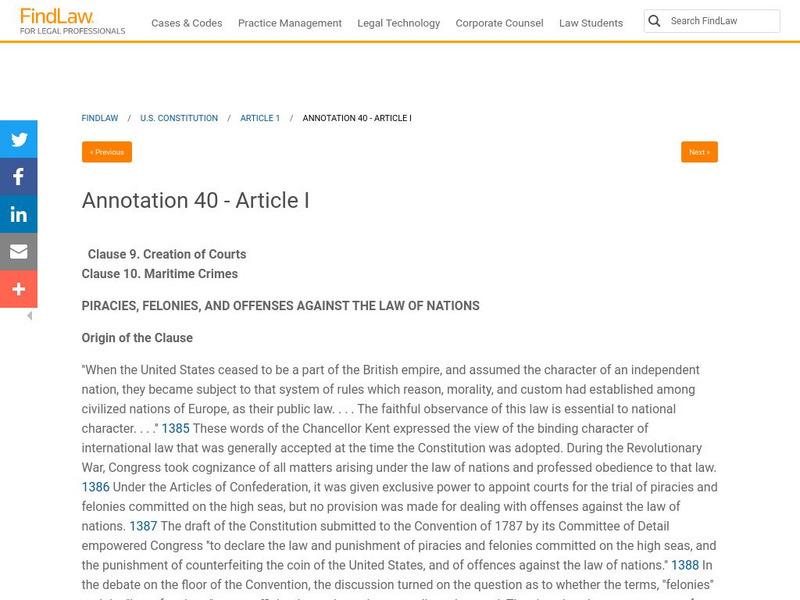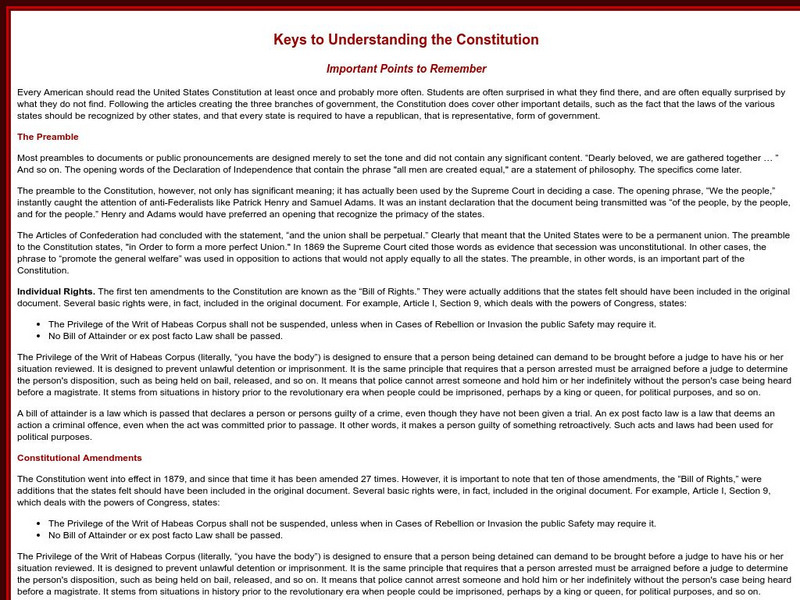Curated OER
Race and Political Representation
Students explore different perspectives dealing with race and politics.
Curated OER
Lobbying for Passage of the National Suffrage Amendment
Students examine the lobbying involved in trying to pass the Nineteenth Amendment. They discover the relationships between women and the suffragists. They also examine the media's coverage of the event.
Curated OER
Ruling Wisely? British Rule after the Conquest
Students research and write an essay comparing the Royal Proclamation of 1763 and the Quebec Act of 1774 in the context of the events surrounding the times.
Curated OER
Investigation of the Warren Court
Learners study period of Supreme Court history when Earl Warren was the Chief Justice and how the cases of this era effected American society.
Curated OER
Lee Yick: Fighting Racism
Students study the 14th Amendment, then review and analyze a Supreme Court brief. There was much racism exhibited toward the Chinese immigrants by the European Americans; this came in the form of institutional racism and mob violence....
Curated OER
Affidavit and Flyers from the Chinese Boycott Case
High schoolers divide into small groups and study one of the three union flyers. Groups share their findings with the whole class and clarify unfamiliar vocabulary terms.
Curated OER
The life of a legislative bill
Middle schoolers investigate bills under consideration by the United States Congress and create a flow chart that tracks the movement of the bills to gain understanding of the legislative process.
Curated OER
It's All About Justice
Students examine a specific environmental concern to their local community. In groups, they explore how the justice system would deal with the problem by participating in a treasure hunt. They review the meaning of federal and state...
Curated OER
Respect and Care of the American Flag
Students properly fold the American Flag and demonstrate proper care and use of the flag to younger students. They properly raise and lower to the flag on a flagpole and demonstrate care and use to younger students as well.
Curated OER
Civil Rights Heroes
Students explore the actions of people involved in the Civil Rights Movement. They explore the reasons for the movement and its successes and failures, and explain the sacrifices made by those who participated in the movement.
Curated OER
You Make the Rules
Young scholars explore the nature of rules and see how they help in the formation and operation of organizations. Working in small groups, students create their own charter for a new club
Curated OER
the Rights of Detainees At Guantanamo Bay
High schoolers identify the legal issues involved in the case of the detainees being held at Guantanamo Bay and surrounding the existence of the base itself. They explain the clash between civil liberties and national security during...
Curated OER
Simulating the Legislative Process
Learners research and simulate a debate of an issue. They simulate proposing a bill to the legislature.
Thomson Reuters
Find Law: Article Iv: Doctrine of the Equality of States
This resource discusses Clause 1, Section 3, in Article IV. It outlines the parameters put in place to ensure that as new states entered the union, power was equitably distributed among all.
Thomson Reuters
Find Law: u.s. Constitution: Seventeenth Amendment: Popular Election of Senators
This resource provides the 17th Amendment, which called for the direct election of Senators. The text is followed by a discussion of the Amendment.
Thomson Reuters
Find Law: Piracies, Felonies, and Offenses Against the Law
This resource explains Clause 10 of Article I of the U.S. Constitution beginning with the origins of "Piracies, Felonies, and Offenses Against the Law of Nations." Further historical background as considered by the Constitutional...
Henry J. Sage
Sage American History: Keys to Understanding the Constitution
Article for students will help them to understand the important points of the Constitution. Discussion on the preamble, amendments, amendment process, voting, laws and the powers and limitations of government.
Thomson Reuters
Find Law: Article Ii: The Creation of the Presidency
A scholarly discussion of Article II of the U.S. Constitution, which establishes the executive branch of the U.S. government. Discusses the origin of the article and the debates on executive power that took place among the Founding...
Thomson Reuters
Find Law: Proposing a Constitutional Amendment
The delegates to the Constitutional Convention had to decide the means of amending the Constitution. Discusses Madison's proposal for empowering Congress to propose amendments, either on its own initiative or upon application by the...
Thomson Reuters
Find Law: u.s. Constitution: Article I, Section 6
This resource presents section 6 of article 1 of the U.S. Constitution, which details the rights and disabilities of members of Congress. The site discusses congressional pay, and privileges from arrest and of speech or debate in an...
Constitutional Rights Foundation
Constitutional Rights Foundation: St. Thomas Aquinas, Natural Law, and the Common Good
Learning activity in which students survey the philosophy of St. Thomas Aquinas and his ideas on government, natural law, and the common good to create policies or programs the U.S. government could enact. Questions for discussion and...
Cornell University
Cornell University: Law School: Equal Protection Overview
A brief overview of the Equal Protection Clause of the 14th Amendment. Includes a link to the full text of the amendment. Discusses equal protection.
University of Oklahoma
University of Oklahoma College of Law: The Annapolis Convention
Historical document reveals details of the Annapolis Convention, a national political convention held in 1786 Annapolis, Maryland, in which twelve delegates from five states gathered to discuss and develop a consensus about reversing the...
Thomson Reuters
Find Law: Annotation 6: Fourth Amendment: The Exclusionary Rule
This resource offers a discussion of the Fourth Amendment, and what has become known as the Exclusionary Rule. Provided on the bottom of the page are footnotes which can be reached by clicking on the links throughout the body of the text.























